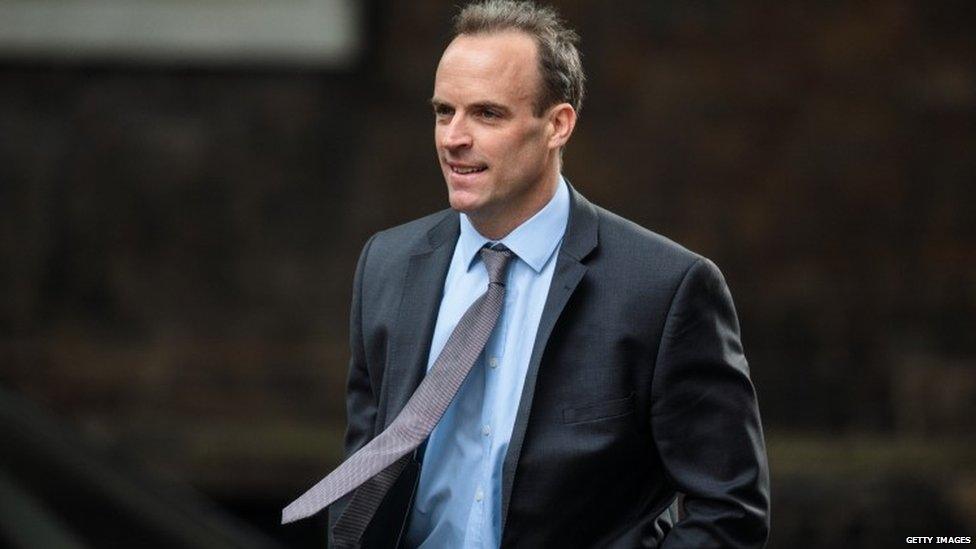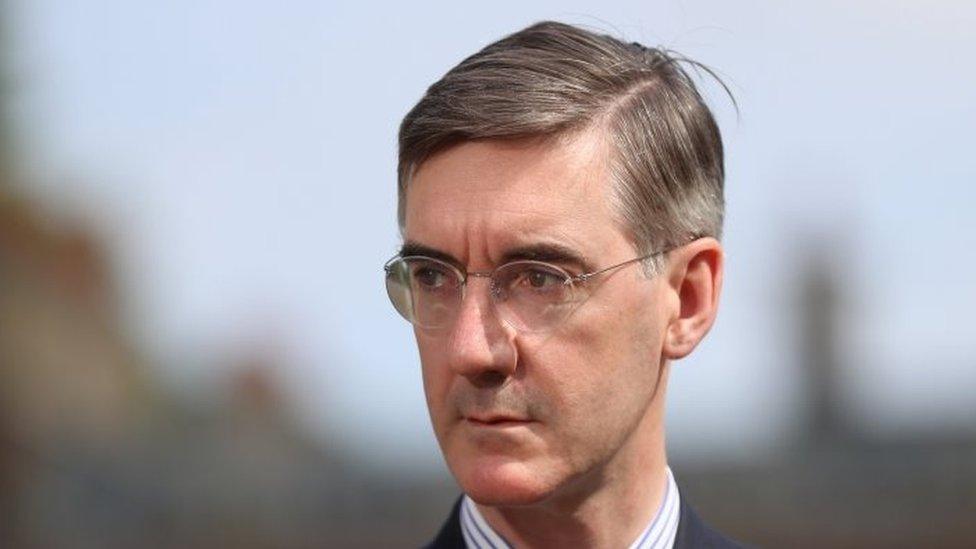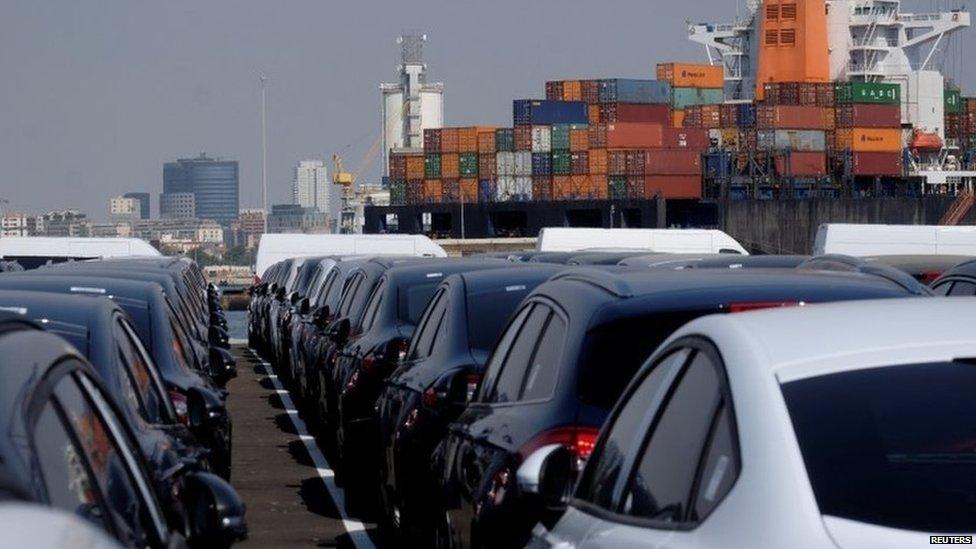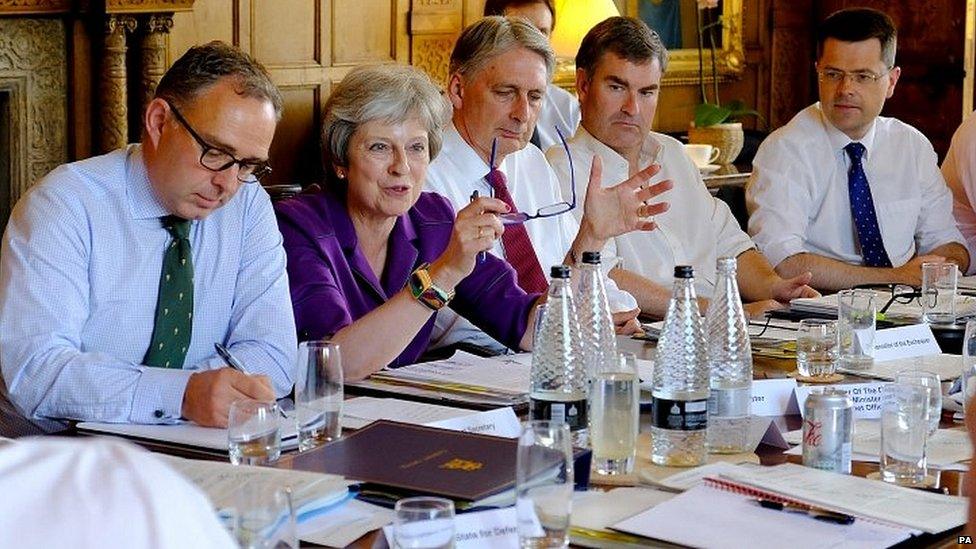PM says White Paper delivers 'the Brexit people voted for'
- Published
- comments
Why Tory MPs are fighting over the government's Brexit white paper
The government has published its blueprint for UK relations with the EU, with Theresa May saying it "delivers on the Brexit people voted for".
The long-awaited White Paper, external is aimed at ensuring trade co-operation, with no hard border for Northern Ireland, and global trade deals for the UK.
But Tory Brexiteer Jacob Rees-Mogg said it was a "bad deal for Britain".
And US President Donald Trump said the proposals would "probably kill" a trade deal with his country.
The White Paper fleshes out the Chequers agreement that sparked the resignations of Boris Johnson and David Davis.
The UK is hoping the EU will back the proposals so an exit deal can be struck by the autumn, ahead of the UK's official departure from the EU in March.
What the government says

Dominic Raab is fronting the plans after David Davis quit earlier this week
New Brexit Secretary Dominic Raab, formerly a leading figure in the Leave campaign, said the White Paper was a blueprint for a "principled, pragmatic and ambitious future partnership between the UK and the EU".
"Now, it is time for the EU to respond in kind, we approach these negotiations with a spirit of pragmatism, compromise and, indeed, friendship, I hope. I trust that the EU will engage with our proposals in the same spirit," he told MPs.
Asked in Brussels about US President Donald Trump's claim that the British people were not getting the Brexit they voted for, Mrs May said: "We have come to an agreement on the proposal we are putting to the European Union which absolutely delivers on the Brexit we voted for.
"They voted for us to take back control of our money, our law and our borders. That is exactly what we will do."
What the Brexiteers say

Jacob Rees-Mogg: 'Not what the British people voted for'
Leading Tory rebel Jacob Rees-Mogg said: "There are very few signs of the prime minister's famous red lines.
"It is a pale imitation of the paper prepared by David Davis, a bad deal for Britain. It is not something I would vote for, nor is it what the British people voted for."
Former Conservative leader Iain Duncan Smith told ministers he had "deep misgivings" about the White Paper.
"I voted to leave not to half leave," he said.
The reaction in Brussels
The EU's chief negotiator Michel Barnier said he would analyse the details with the European Parliament and member states and was "looking forward" to negotiations with the UK next week.
Allow X content?
This article contains content provided by X. We ask for your permission before anything is loaded, as they may be using cookies and other technologies. You may want to read X’s cookie policy, external and privacy policy, external before accepting. To view this content choose ‘accept and continue’.
Guy Verhofstadt, the European Parliament's chief Brexit negotiator, said he welcomed the UK's proposal for a future "association agreement" with the EU - an idea he has been promoting for some time.
He added: "We will analyse the White Paper in light of our priorities: citizens' rights, an operational backstop for Ireland and a deep economic relationship based on the integrity of the union and internal market."
Business and union reaction

A free trade zone for goods is at the heart of the proposals
CBI director general Carolyn Fairbairn said "many of the intentions are reassuring" but "there are gaps in these proposals and more detail is needed on EU VAT, some services sectors and the new customs system".
"It's vitally important UK negotiators get their heads down and work with businesses to grapple with the detail and get it right," she added.
Federation of Small Businesses national chairman Mike Cherry said: "With just 37 weeks before we leave the European Union, we need to see tangible and comprehensive details on these proposals and how they will impact small businesses."
Former chief executive of UK Trade and Investment Sir Andrew Cahn told the BBC the City would be hurt by the lack of a deal on financial services, stating: "It means the City is going to have to change. It's going to have to change quite radically.
"We will clearly lose business, some business, to Europe. But I think the City will adjust and find a way forward."
Len McCluskey, general secretary of the Unite union, said the White Paper was "a fudge, which pleases no one and is politically undeliverable".

Analysis, by BBC Political Editor Laura Kuenssberg

The proposals were approved by cabinet last Friday but soon led to a big political fallout
Some MPs are already calling it a "hard Brexit" for services, even though, overall, the deal suggests much closer ties to the rest of the EU than many Brexiteers had desired.
For the prime minister and the government it's an important step in spelling out the reality of leaving - more political freedom does, this paper suggests, come at a cost.
And it is a compromise, which by its very nature, can't please everyone.

Chaotic scenes in the Commons
Speaker John Bercow and MPs were unhappy at the White Paper's late arrival
Dominic Raab's first speech as Brexit Secretary was halted shortly after it had begun, as MPs shouted that they had not seen the White Paper.
Mr Raab said the paper would be made available "as soon as is practicably possible".
Former Labour minister Ben Bradshaw could be seen throwing copies of the document to MPs on his own bench.
At which point, Speaker Bercow decided to suspend sitting for five minutes to give MPs time to read it.
Allow X content?
This article contains content provided by X. We ask for your permission before anything is loaded, as they may be using cookies and other technologies. You may want to read X’s cookie policy, external and privacy policy, external before accepting. To view this content choose ‘accept and continue’.
Labour's Shadow Brexit Secretary Sir Keir Starmer said Mr Raab had "not got off to a very good start", adding: "The utter shambles of the last 20 minutes that led to the suspension of the House during a statement is clear evidence of why the government is in such a mess."
Labour's view on the White Paper
Sir Keir told MPs: "Across business communities, among trade unions and I genuinely believe across this House there is growing unity that the UK should remain economically close to the EU - and that means negotiating a comprehensive customs union with the EU27, and a single market deal with the right balance of rights and obligations tailored to the UK."
Labour MP Chuka Umunna, who, is campaigning for a referendum on the final EU deal - in contrast to his party's leadership - said the White Paper was "totally unworkable and a bad deal for Britain".
What's in the White Paper?
It sets out four areas of future co-operation:
The economic partnership between the EU and the UK
Security co-operation
Future co-operation in areas like aviation and nuclear power
The "institutional frameworks" that will enforce the agreement
The document repeatedly acknowledges that the UK will have more barriers to trade in some areas than there are today.
It sets out plans for what is described as an "association agreement", with "joint institutional arrangements" between the EU and the UK.
What about free movement?
The paper says that the UK will end the free of movement of people, but suggests EU citizens would be allowed to come to the UK without visas to do "paid work in limited and clearly defined circumstances".
No more detail of this was given by officials on Thursday morning, says BBC Political Editor Laura Kuenssberg, but they rejected suggestions that it could open the door to freedom of movement for workers.
The paper also suggests that there could be "reciprocal" arrangements with the EU for the payment of certain limited benefits or social security.
Again, officials denied that this would mean widespread access to the UK benefits systems for EU nationals after Brexit, says our correspondent.
Both of these elements will be subject to the upcoming negotiation.
And the European Court?
As the Chequers agreement set out on Friday, the UK would accept a "common rule book" for trade in goods, but not services.
The government's aim is to preserve free trade in that part of the economy and avoid a hard border in Northern Ireland.
The White Paper also proposes the setting up of a "governing body", made up of UK and EU ministers, and then a "joint committee" of officials, which would enforce the agreement.
Officially, the jurisdiction of the European Court of Justice in the UK would come to an end.
British citizens or businesses would no longer be able to take issues to the European Court of Justice - and the court would no longer be able to make judgements on UK cases.
But the White Paper accepts that the European Court of Justice will be "the interpreter of EU rules" that the UK has agreed to follow in the "common rule book".
Customs proposals
The White Paper also sets out in more detail the government's proposed customs system, the Facilitated Customs Arrangement for goods and agri-foods, where it plans for the UK to collect some EU tariffs.
The paper confirms that the UK will not seek "mutual recognition" in the services sector, which makes up the vast majority of the economy.
A leaked version of an earlier draft of the White Paper, put together by the Brexit department under David Davis, envisaged that there would be such an arrangement.
Some MPs have already expressed concern that by pursuing a looser arrangement with the rest of the EU on services it means a "hard Brexit" for the majority of the economy while the goods sector stays closely tied to the single market, although technically not inside it.